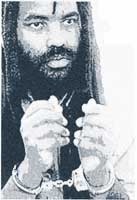from Mumia Abu-Jamal on death row
Haiti on our minds
Published Jan 31, 2010 7:59 PM
Taken from a Jan. 17 audio column at www.prisonradio.org.
The recent natural disaster in Haiti has once again thrown Haiti into the eyes
of the world and once again brought out the best and the worst of us. The sheer
scale of human suffering has evoked massive compassion as governments far and
wide mobilize to assist those unable to assist themselves.
Haiti, once the colonial era “pearl of the Antilles,” then the
mother of revolutions, has suffered for nearly two centuries for daring to
fight for and win its freedom from European colonialism and plunder.
Haiti, we are informed by the corporate media, is the poorest nation in the
West. We are never told, however, how it got that way. How many of us know that
the U.S. brutally occupied Haiti and stayed there for more than 20 years! Or
that Haiti, which had the temerity to defeat not one, not two, but three
colonial armies — the French, the British and the Spanish — was
forced to pay French reparations for nearly 200 years. The first and only time
that a victor in war had to pay back the nation it defeated.
Haiti isn’t just poor. It has been impoverished by a global system of
exploitation and a plantation capitalist economy that was designed as a
sanction for Black liberation.
C.L.R. James, the great revolutionary scholar-activist, has argued that the
Haitian revolution was a singular event in human history of more significance
than either the French or the American revolutions. In part that is because the
Haitian revolution spelled the end to French imperialism in America. Napoleon,
having lost his Haitian cash cow, sold vast lands to the U.S. for a song,
doubling the size of the U.S. in one day.
That an American preacher could today liken the event to the devil gives us
some idea of its continuing power. Interestingly, neither of these other
revolutions could spell the end of that truly demonic institution, slavery.
Indeed, the reverse is true. For George Washington and Thomas Jefferson were
slave owners. And Napoleon Bonaparte sent his army to Haiti to defend
slavery.
Decades and decades of U.S.-supported dictators, the legacy of plantation
capitalism and exploitation, U.S.-supported coups like the Bush-era removal of
President Jean-Bertrand Aristide, and corporate strangulation of the poor
workers in Haiti have left it severely underdeveloped and thus less able to
cope with natural disasters when they strike.
Several years ago when a hurricane hit a city in the world’s wealthiest
nation, the wealthy and middle classes had the resources to flee just before
the worst struck the town. In Haiti those resources were even more rare. But an
earthquake isn’t a hurricane. It strikes suddenly, without warning. But
many nations like Japan have constructed buildings which resist the bumps and
whirls of earthquakes. Such techniques if applied to Haitian schools, homes and
offices could have greatly reduced loss of life and suffering.
If it hadn’t been bled and exploited for centuries, Haiti would have had
the resources available to protect its people as much as possible.
Let us hope that Haiti’s future will be brighter than its postcolonial
past.
Articles copyright 1995-2012 Workers World.
Verbatim copying and distribution of this entire article is permitted in any medium without royalty provided this notice is preserved.
Workers World, 55 W. 17 St., NY, NY 10011
Email:
[email protected]
Subscribe
[email protected]
Support independent news
DONATE


